A compilation of stories about the Rebbe and Chassidim that were told by R’ Yekusiel Farkash of Yerushalayim.
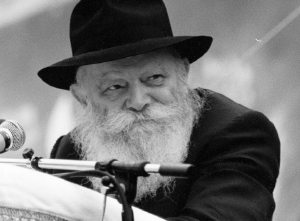
1
One year, R’ Avrohom Maiyor farbrenged the first night of Sukkos in his son-in-law’s sukka. R’ Avrohom said l’chaim and farbrenged nearly the entire night, with the fish portion still in front of him as farbaisen (something to bite into between drinks). He went on and on about how the Rebbe had sung “Tzama Lecha Nafshi” at the farbrengen the previous night. He kept repeating, “Did you hear how the Rebbe sang ‘Tzama Lecha Nafshi?’ In himmel arain [in the Heavens]!”
R’ Zalman Gurary entered the sukka and sat down next to R’ Avrohom. R’ Avrohom “gave it to him,” saying: During the dark period, I was very brokenhearted and could find no peace of mind. Then I met you and as a close friend of mine, I told you my sorrows. You gave me an idea, that I should go to the Ohel of the Rebbe Rayatz and tell him my troubles and with Hashem’s help, I would feel better.
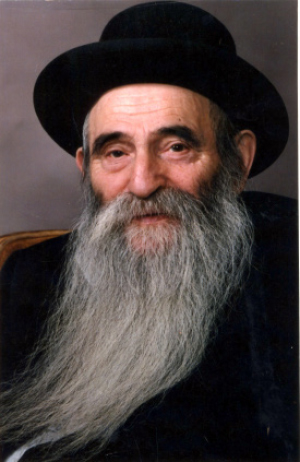 R’ Avrohom MaiyorAt first, I liked your idea, but then my wisdom stood by me and at the last moment I remembered that it was a terrible idea. We know that the Rebbe goes often to the gravesite of his father-in-law, the previous Rebbe, and when the Rebbe would go again, no doubt, the Rebbe Rayatz would tell him that Avrohom came and told him such and such. That’s all I need …
R’ Avrohom MaiyorAt first, I liked your idea, but then my wisdom stood by me and at the last moment I remembered that it was a terrible idea. We know that the Rebbe goes often to the gravesite of his father-in-law, the previous Rebbe, and when the Rebbe would go again, no doubt, the Rebbe Rayatz would tell him that Avrohom came and told him such and such. That’s all I need …
2
I attended a Yud-Tes Kislev farbrengen with the mashpia, R’ Mendel, in the course of which he tried speaking to one of the older bachurim several times. He spoke in a roundabout manner and said to him: There was once a person walking down the street who had coal smeared on his forehead. A passerby points it out to him, but he says, I don’t see any coal (since he can’t see himself). Nu, he’s a fool. If he had the brains, he would wipe it off. Saying this, R’ Mendel lifted the brim of his Russian cap and demonstrated how to wipe off coal.
After several hours of saying l’chaim, and being somewhat inebriated, R’ Mendel focused his attention on that bachur and began pestering him to say l’chaim, but the bachur was stubborn and refused. R’ Mendel did not give up. Finally, R’ Mendel said to him: I want to tell you a story. In the yeshiva I learned in when I was young, we had a very tough mashgiach who made our lives miserable. Obviously, we didn’t like him much. We always hoped we could get rid of his heavy yoke.
One year, there was a big farbrengen in yeshiva and the mashgiach drank way too much mashke until it seemed he had died. But after treating him the way they did in those days, there was resurrection of the dead. The mashgiach was revived and we were forced to suffer under his yoke once again.
Said R’ Mendel to the bachur: Why are you afraid to say l’chaim? The worst case is that something will happen to you. I promise to put you in a bathtub of mustard and you will come back to life; there’s nothing to worry about.
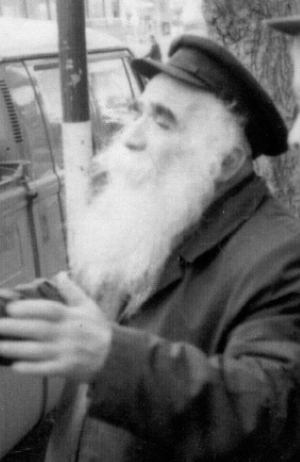 R’ Mendel3
R’ Mendel3
We know that sometimes the “mashpia” needs a “korban – sacrificial lamb” upon whom he constructs a farbrengen in the style of “one addresses the daughter but means the daughter-in-law.” At the Chai Elul farbrengen I was the korban and for that purpose, R’ Mendel named me Kutche Liepler – the famous Chassid R’ Yekusiel Liepler.
R’ Mendel said: We know that R’ Kutche Liepler had a jolly disposition (as in the story where he got up to dance with the mailman) but twice a year he was very worried, the night of b’dikas chametz and at Kaparos on Erev Yom Kippur.
R’ Mendel asked: I understand what there is to be worried about by b’dikas chametz, for what Chassidus explains about the inner meaning of b’dikas chametz is known, that it refers to the animal soul and the improper thoughts, speech and actions that need to be examined and burned. But what did he have to worry about at Kaparos? Kaparos is about atonement and being cleansed, with the soul becoming purified, so why the concern?
The answer is: Sometimes, during Kaparos, the chicken decides to relieve itself on the head of the one gaining atonement. There are two types of people. There’s the fool, who the moment the chicken relieves itself immediately gets rattled and throws the chicken away and stops rotating it. But the wise person remains unfazed. He wipes up and continues rotating the chicken.
In spiritual avoda, this is the idea of the bedtime Shma, when a spiritual accounting needs to be made for the day that just passed. Sometimes, one reminds himself of some “wonderful” thing or another that he did that day and his spirits plummet. The smart thing to do is not to be broken and immerse oneself in this but to wipe it off and continue onward.
4
When I learned in the Tzemach Tzedek kollel in the Old City, on Pesach Sheini we would go to Kfar Chabad because at that time, there was a horaa from the Rebbe not to remain in Yerushalayim because of the obligation to sacrifice the Pesach Sheini. R’ Mendel would farbreng especially for us.
One year there was a big farbrengen in which only married men were allowed in, not bachurim. That was a fiery farbrengen. R’ Mendel was in fine form and really “got down” on the more prominent characters and it was lively and joyous … One of the things he spoke about was how R’ Chanoch Hendel Kugel became close to the Tzemach Tzedek. This is what he said:
R’ Hendel and his brother would sit and learn together in the beis midrash in the town where they lived (for there weren’t many yeshivos for bachurim in their country). One day, on Rosh Chodesh, late in the morning, a man appeared at the beis midrash carrying a large sack. He removed from it a thick book, a tallis and t’fillin (the book was apparently a Likkutei Torah or some other seifer of chassidus).
After learning for a while, he wrapped himself in his tallis and put on his t’fillin and got up to daven, as a Chassid of the Tzemach Tzedek davened. The bachurim sat there open-mouthed in astonishment for they had never seen nor heard t’filla with such an outpouring of the soul. They especially took note that during Hallel, when he reached the verses of “Min HaMeitzar” his heart poured out like water with tremendous sobbing. And even more when he said the verses, “They surrounded me like bees,” he nearly expired.
After he finished davening, they went over to him and apologized for asking, but they wanted to know what was so moving about the verses “Min HaMeitzar” and “They surrounded me like bees.”
The Chassid said: A Jew has two souls, a G-dly soul and an animal soul [here, R’ Mendel paused and corrected himself (from which we learn how accurate we should be when telling a story) and said: It is unlikely that he used those words for how would they know the terminology of animal soul and G-dly soul? He surely said yetzer tov and yetzer ha’ra]. The G-dly soul is in captivity and imprisoned within the animal soul and it cries out from those constraints for Hashem to answer him.
The hardest situation is one of being surrounded by bees. A bee is a creature which gives forth sweet honey, but it also stings. Being that this is the case, we say, “[give me] not of your honey and not of your sting.” There are things which one claims are mitzvos, which seem as sweet as honey, but in doing these mitzvos, one gets a sharp sting as he can be easily drawn into temptations etc. We cry out about this and plead that Hashem rescue us. “I was pushed to fall and Hashem answered me.”
The bachurim asked this Chassid, where does one learn to daven like that?
He said: Come to Lubavitch to the Rebbe, the Tzemach Tzedek, and you will learn to daven.
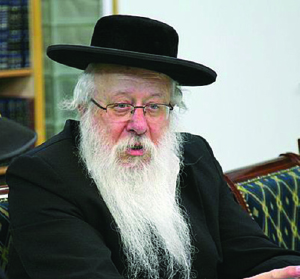 R’ Yekusiel Farkash5
R’ Yekusiel Farkash5
Many times people saw that by the Rebbe there is no such thing as “impossible” or “I can’t.” On the contrary, if you did “one hundred,” you immediately were asked about “two hundred.” This actually happened to me.
I think this occurred Motzaei Simchas Torah 5732. The Rebbe said everyone ought to learn smicha for Yoreh Yoreh, and whoever already had that, should work to get Yadin Yadin. I had learned Shulchan Aruch Yoreh Deia in depth for years but never thought of getting smicha. When I heard what the Rebbe said, I wanted to do it, and I began reviewing the material that I learned and I had a chavrusa to learn with.
At that time, I was asked to be a maggid shiur in Yeshivas Toras Emes in Yerushalayim. I was unsure about what to do for it was simply impossible to do both. I asked the Rebbe whether to accept the position in yeshiva or immerse myself in learning horaa. The Rebbe erased the word “whether” and “or” and added the connecting letter Vav to the word “immerse” and added a circle and an arrow so that what remained in the circle was “to accept the position and immerse himself in the study of horaa.”
6
For a period of time there developed a connection between myself and a doctor in Hadassah Hospital who worked in the oncology department. He had no knowledge of Torah and mitzvos since he came from a South American country and his family was cut off from Judaism for generations. But he had quite a few letters from the Rebbe, because people who were hospitalized in this department asked him to write to the Rebbe to ask for a bracha for them and he did so willingly. The answers came to him.
I decided to take advantage of people’s interest in learning “kabbalah” by learning Tanya with him, for this serves as a platform from which one can instill foundations of faith and Judaism which lead to practice. The man was very interested and began putting t’fillin on every day and wearing a kippa, even at work, and keeping Shabbos. But his wife, despite my speaking to her and debates which ensued in which she was left without a response, insisted that she was happy with the way things were and she did not want to change. She even served as the Shabbos goy in the house.
One day, I arrived for the usual shiur in their house. I knocked again and again but nobody answered. I kept trying and finally the doctor opened the door and I could see that the house was dark, the shutters closed, and there was an oppressive atmosphere. I walked in and asked what was going on. He said his wife was in critical condition and they were afraid that soon she would … for it was an entire week already that the moment she closed her eyes to sleep her entire body would convulse with terrible seizures, so she hadn’t slept in a week. She was hospitalized in Hadassah by Dr. Lavi who was considered the biggest neurologist there (she was his assistant and therefore he personally treated her), but he was unable to come up with a solution to her problem and she was sent home. Now she was so debilitated that she could not get off the bed without being carried.
I told him it is forbidden to despair; we have a Rebbe and he had to write to the Rebbe and ask for his blessing and advice. But, as an enlightened man, he did nothing without his wife’s explicit permission. So I asked her to give him permission to write to the Rebbe.
With her usual stubbornness, she refused and said it was not possible that the Rebbe, who did not see her medical file, could say what to do in her case.
I told her that this would be correct if we were talking about an ordinary human being, but the Rebbe …
She still said no. I decided to do something extreme and it worked. I told her, okay, you continue being stubborn and obviously, you won’t survive till next week, and on your gravestone it will say, “She died and left her husband a young widower and two children orphans because she sacrificed her life not to write to the Rebbe.”
It worked! She agreed. We wrote to the Rebbe and I told the husband to sleep in the living room because that is where the only phone in the house was.
The next day I called to ask what was happening. She picked up the phone and said that the Rebbe’s response was, “kashrus of food and drink, I will mention at the tziyun.”
“What does that mean then?” she asked. “No more shrimp and we’ll have to buy kosher food?”
I told her, “No, that’s not enough. We will come on Motzaei Shabbos (we were talking on Friday) and kasher the kitchen and you’ll need to keep meat and milk separate etc. Hearing this, she reverted to saying she didn’t want to and I repeated the frightening scenario of her dying with mesirus nefesh not to listen to the Rebbe and to leave her husband and children etc. She agreed.
Time passed and as it approached candle-lighting time, I got up my courage and called them, all nervous, and asked, “So, what’s with the seizures?”
She said, “R’ Farkash, don’t talk any more about seizures. I slept for seven hours straight and there are no more seizures. But you see the Rebbe is smart. It wasn’t like you said that I need to be religious and keep everything; he only asked for kashrus.”
I said to her, “Right, the Rebbe is wise, and also has prophetic spirit and so he knows that I already tried to convince you for months to be religiously observant and got nowhere, since the mind is blocked by forbidden foods. The moment you start eating kosher, all the previous efforts will produce results.”
In short, after a while they began keeping everything and even took their children out of secular school and transferred them to a religious school, and then to a Chabad school.
This woman’s name and her mother’s name don’t give away the fact that they are Jewish. Some years later, when a question arose about her Jewishness, the fact that the Rebbe instructed her about kashrus made it clear there was no doubt about her being Jewish.
7
Another miracle and ruach ha’kodesh story in connection with this family goes as follows. One day, after she committed to keep Torah and mitzvos and, as usual in these situations, she took small but sure steps, her husband the doctor came to Toras Emes and brought me a letter which he received from the Rebbe. He said the letter was full of abbreviations and he could not understand what it said and asked for my help in deciphering it.
I saw that the Rebbe addressed him with all kinds of additional wondrous titles. I said, “Tell me what’s going on here. Until now, the Rebbe addressed you as Dr. and now you’re a full-fledged Chassid with all the titles. Something changed that you didn’t tell me about.”
He told me the secret; his wife had decided to start keeping the laws of family purity.
The Rebbe had sent the letter a few days before that, and it arrived precisely at the right time, with the appropriate titles.
8
Speaking of titles, here is something else connected with this doctor. The titles the Rebbe wrote to me were always the same. The only time the Rebbe added the title oseik b’tzarchei tzibbur (one who is involved in communal works) was during the period of my involvement with this doctor and his family.
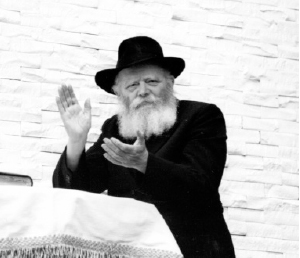 9
9
Another amazing miracle with the wife:
One day, as I sat in the office in Toras Emes, I received a phone call from the husband, the doctor, who said she was suffering from severe constipation. All the doctors who tried treating her were unsuccessful and she was suffering tremendously to the extent that she couldn’t get out of bed.
Naturally, I suggested writing to the Rebbe and she did. The Rebbe’s answer, which came a few hours later toward evening, said she should start getting involved in chesed, at first from bed and then in the usual way.
I told her, “See, first of all, you have a promise from the Rebbe that you will get better and back on your feet, so you should be happy already.”
She wanted to postpone for the next day, but I insisted that she had to start doing chesed now. It so happened, by divine providence, that I knew through a Lubavitcher woman who ran a chesed organization for the needy, about a large family where a baby had been born and they had no carriage or crib for the baby. I said to the sick woman that surely in her neighborhood, which wasn’t religious and where most women had only one child, these items were put in storage. She should make some calls and get a carriage and crib and then call the woman who ran the organization so she could give the items to the family in need.
She did it and within a few hours she was cured. Later on she started a sisterhood for the yeshiva and they raised money to improve the dormitories.
10
For a period of time I kept moving from apartment to apartment until I received a special mortgage from the Housing Ministry as part of a program designated for large families. It seemed to me that some money remained in the account, and just at that time I was made an offer by a doctor-friend who was going to open a special clinic. It was going to be a sort of private practice for those who belonged to that health care plan and which would provide services around the clock.
He offered that I invest a very small sum which was what I could manage at that time, and in exchange, he promised nice profits. I consulted with friends who were knowledgeable in business, an area in which I am no big expert and after two weeks of checking out the market they said to me, “You are making the deal of your life, it’s unbelievable!”
After all that, of course I wrote to the Rebbe to ask his advice. The answer was, this was for people who had extra money and didn’t know what to do with it “and it is not at all relevant to you.” These last words were underlined! Obviously, with an answer like that, I did not consider investing any money there.
Two years went by and one day I happened to be in the neighborhood of Yerushalayim where this clinic was located. I was curious to see what was happening there. As I approached the window I heard loud voices from inside. I wanted to leave immediately but the doctor who had made me that offer saw me from the window and called out, “Come on in and mediate between us.”
I went in and saw representatives of Swedish businessmen sitting there, who had invested in this business. They were angry and screaming at the doctor that every few months he asked them for more money to invest, and in the meantime there were only losses and nothing was happening as he had promised.
11
In Tishrei 5739/1978, I went to 770 with my oldest son Velvel. After the holidays we had yechidus with the Rebbe. After the Rebbe finished talking to me about the issues I had written about and submitted, he asked my son, “What are you learning?”
He said: Tractate Bava Kama.
The Rebbe asked, “Which chapter?”
He said, “Four main categories of damages.”
The Rebbe asked, “What are they?”
My son enumerated: Shor (an ox), Bor (a pit), Mav’eh (see further), and Hev’eir (fire).”
The Rebbe asked, “What is Mav’eh?”
My son said it’s a dispute, Rav says it’s (damages caused by) man and Shmuel says it’s tooth (damages caused by an animal eating).
The Rebbe asked him, “Why did the Tanna, who clearly said Shor, Bor and Hev’eir, have to use unclear language when it came to Mav’eh so that it came to a dispute between the Amoraim? He should have written clearly and prevented a dispute.”
My son did not know the answer and I was afraid that the Rebbe would ask, “What does your father have to say about this?”
The truth is, I had no idea.
The Rebbe asked him, “Where do you learn?”
He said he learned in Eitz Chayim.
“Eh?” asked the Rebbe as though not having heard him clearly. By Chassidim we know that it’s not that the Rebbe did not hear but he was not satisfied by the answer.
The yechidus ended and I’ll never forget what happened next. My son cried all night and could not be consoled. I said to him: The Rebbe did not want to trip you up, G-d forbid. The Rebbe simply wanted to hint to us that we need to switch you and the other children to Chabad schools. And that’s exactly what we did when we returned home.